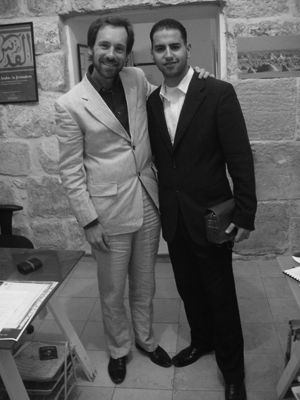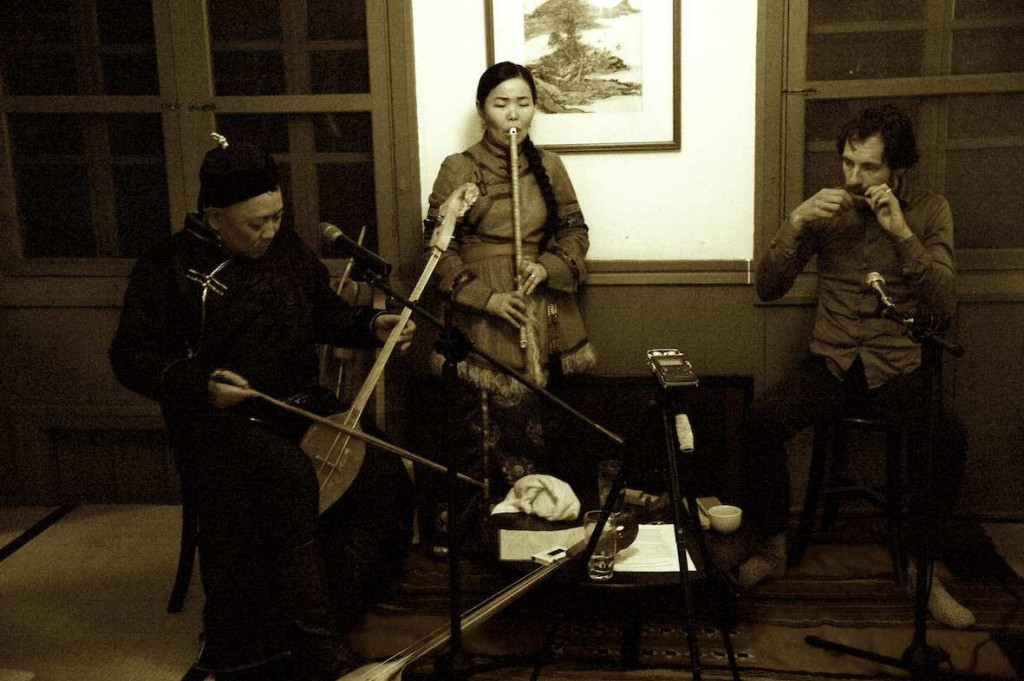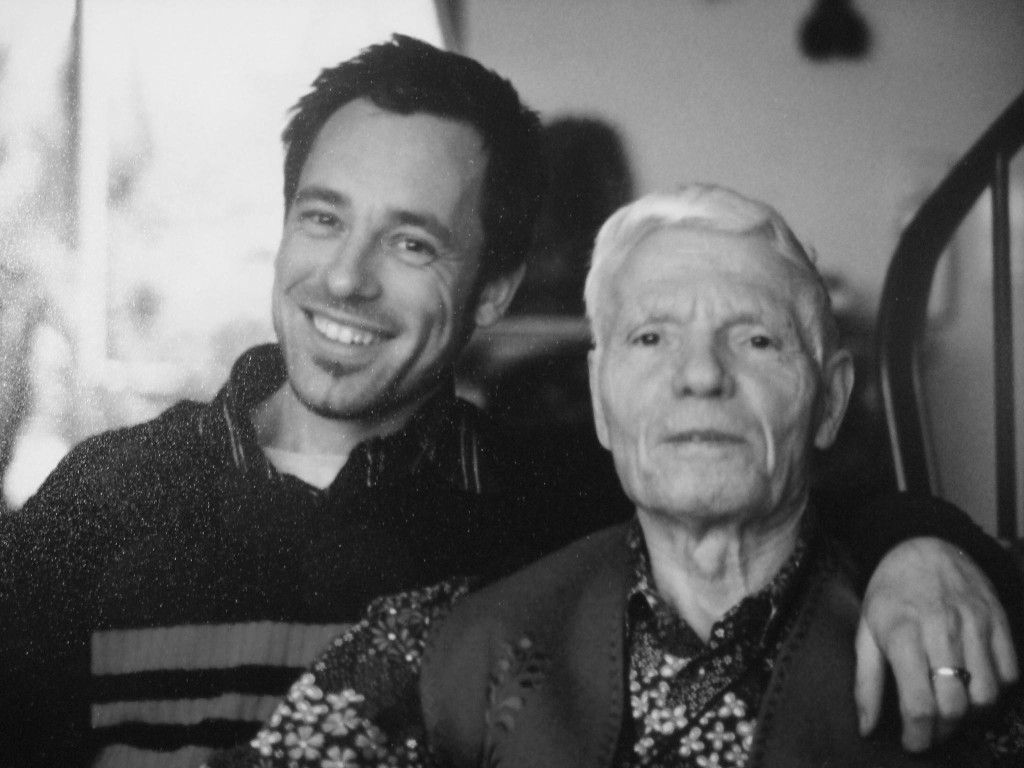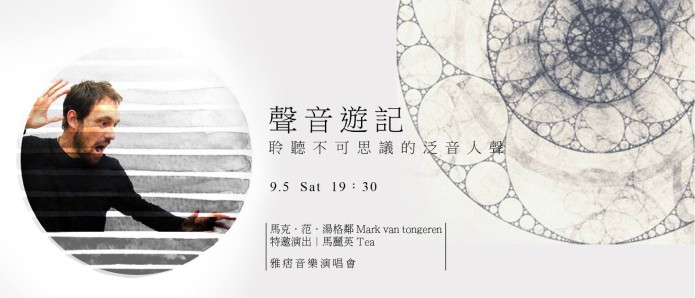This Saturday evening (September 5, 19:30, at Yuppy Cafe/Bookstore) I’ll be doing a concert of songs I have learned from oral traditions of various places around the globe. Tea (Tina Ma) is going to help create some links between them in her own magical way. After that, I will sing together with the audience and give an idea what we do in the R e s o n a n c e course.
For me this is a real first, to sing ‘plain’ traditional songs: I have never quite thought of myself as a ‘traditional singer’ of any kind and only reluctantly began to sing Tuvan khöömei (throat singing or overtone singing) when I was asked to. I developed an interest in singing Dutch songs at the time my son and daughter were born. Since then (and maybe because of that) I have changed my attitude towards traditional music. I slowly started to learn more songs in traditional ways, instead of ‘appropriating’ other music for my own musical language. I am now learning and singing songs from Tuva, Corsica, The Netherlands and other places for some years, and feel ready to present them onstage.
I began travelling to collect and learn music in 1990, when I visited Bulgaria. Then to Corsica in 1991. Then Russia in 1992, which was the upbeat for Siberia in 1993, where I went back several times. In the 2000s I visited New Zealand, Dharamsala, Jerusalem and Sardinia, amongst other places, and began moving to Taiwan. All the while I also met many travelling and migrant musicians, learning from or with them from time to time.
This Summer I visited Turkey and had an opportunity to learn a song from a well-known Turkish folk singer, Aysegül Aral. I was curious to learn more about singing with the quartertones you can find in Turkish and Arabic music, and I was happy to find I was doing alright, according to my instructor Aysegül. The song we sang (and which I will perform Saturday) is called Havada bulut yok, a well-known folk song.

Aysegul Aral, the interpreter and me
Another special meeting several years ago was with Firaz Ghazzaz, a muslim reciter for the Palestine community of Eastern Jeruzalem. We collaborated in a project by two Dutch composers, Merlijn Twaalfhoven and Paul Oomen, helping to give voice to the suppressed communities of Palestines in Jerusalem. Firaz is the descendent of a long line of reciters for the Al Aqsa Mosque (going back for as much as 422 years when I visited). Al Aqsa is one of the most important mosques in the Arab world, situated on holy, historic territory in Jerusalem. I was struck by the humanity and the willingness to improvise, leaving his religious tradition behind to look for common ground in my improvised, coloristic, harmonic language and his own modal chanting. There is tremendous power and refinement in his singing, as you can hear in Firaz’ collaboration with another musician from Europe here.

With Firaz Ghazzaz, 2009
In Corsica, the French isle, you can hear echoes of this kind of intonation, though very distant ones. In this case they stem from the need for voices to harmonise according to pure, Pythagorean intonation, and not because of a modal tuning system as developed by the Arabs. In recent years, when I re-visited Corsica, I had many opportunities to immerse myself in polyphonic singing, and take part in it. Now I feel ready to sing some Corsican songs, but of course there will be no polyphony this Saturday (though I am considering to teach the audience a simple line so we get two parts). This year I joined the concert of musicians from Pigna: Nando Aquaviva and his daughter Battista, and Cecce Pesce, the guitarist. When we first met, Battista was beginning to be famous in Corsica. This Summer, she suddenly was famous all over France due to her appearance in the popular TV show The Voice.
In 2013 I sang some ‘alle-male’ polyphony with Claude Bellagamba, a middle-aged singer with an exceptional, powerful and natural voice, and Nando, who is past his prime years (he is 70+) but still getting along well and very active musically.

Claude Bellagamba, Nando Aquaviva and me singing polyphonic songs, Corsica 2013
Of course there will be music from Tuva, Siberia. Choduraa Tumat and Otkun Dostay, who came over from Tuva to perform in Taiwan this spring, helped me with the lyrics of a well-known song by the folk singer/composer Maksim Dakpai. In their concerts we did not sing this song, but contemporary and shamanic improvisations with voice and Jew’s harp. I did not quite feel up to singing traditional songs with them onstage: to be honest, I think for singing traditional music you need to know the lyrics by heart, and I am still struggling with that. In that sense my concert this Saturday is not so traditional: I will need the help of written lyrics on a sheet for sight-reading for most of the songs. The ‘shamanic’ improvisation is one possible way out of that problem, but not just second choice. Besides singing Dakpai’s song Saturday, I will also do a shaman-styled improvisation.

Otkun Dostay, Choduraa Tumat & me at Wistaria Teahouse, 2015 (photo by Ewan Kuo)

I visited Hungarian shaman and sound practitioner Joska Soos several times in Belgium.
I have spent much time learning a Hakka song, Hakka being one of the Chinese minorities in Taiwan (and China) with a distinct culture and music. I have always liked Hakka music when I heard it on the radio here, but it is not easy to sing it. My kids learnt some Hakka songs at school and I had great difficulty to get the melody right when I asked them to teach me (and how lucky I am with children who have such critical ears at such an early age!). This year I am working on a dance piece with Taipei Dance Circle, founded by Hakka choreographer Liou Shaw-lu. In order to pay tribute to Shaw-lu, who passed away a year ago, we decided to sing a Hakka song for him. The dance performance will première next week in Taipei’s National Theatre (Experimental Theatre), so I take the chance to do a try-out of Lao shan ge at Yuppy Bookstore.
Then there will be an indigenous Taiwanese song and things from Mongolia, India and of course the Netherlands.
Talking about oral traditions, there is Tina ‘Tea’ Ma, or … is she? It is still a little bit of a mystery what she will do, or even that she makes it, immersed as she is in Taiwan’s East Coast indigenous Amis communities. She seems to be forgetting the time in Hualien (we all do when we go there!). I am not even sure she will manage to get out of the spell of the songs and rituals she is learning there. If she makes it, she may turn out to be the most ‘traditional’ or ‘authentic’ of the voices you will hear this Saturday. Let’s hear!
Info and reservations at Yuppy Cafe and Bookstore .

Tina ‘Tea’ Ma with moonlute


